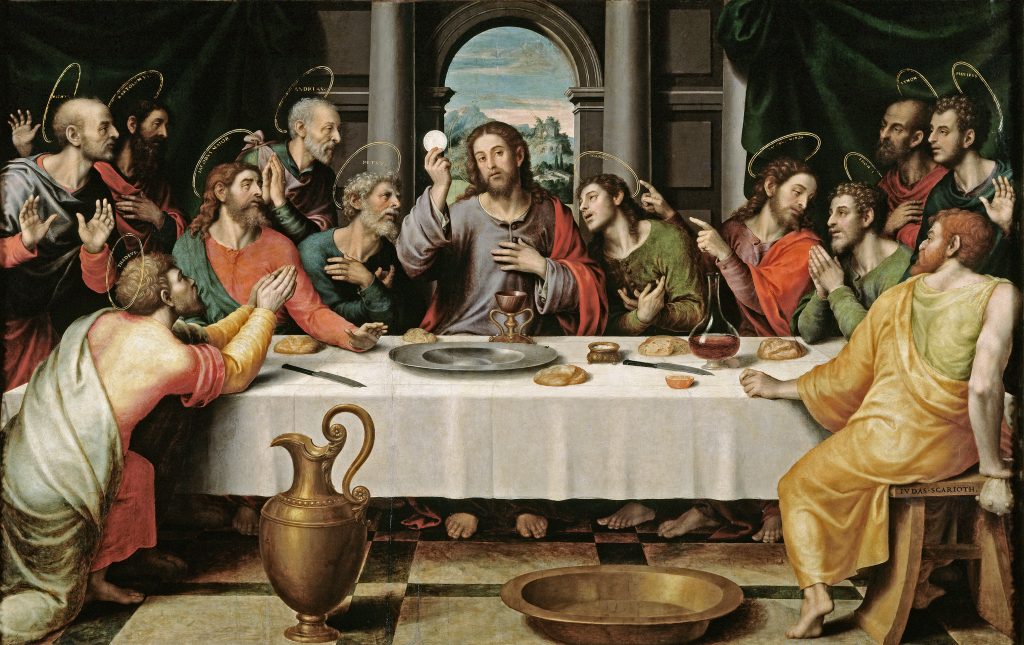
Lesson Objectives
- To read Genesis 12-50 with understanding.
- To understand God’s covenant with Abraham and to see how that covenant is fulfilled in the New Covenant of Jesus Christ.
- To appreciate key figures and elements in the Abraham story - Melchizedek, circumcision, the sacrifice of Isaac - as they are interpreted in the Church’s tradition.
I. Review and Overview
Let's start this lesson with some review: We're studying salvation history - the story that the Bible tells - by studying the covenants, which form the "backbone" or the "skeletal structure" of the Bible.
In the ancient world, covenants established family relationships. The covenants God makes in the Bible do the same thing. By His covenants, God establishes a family relationship with His creatures, the human people made in His image and likeness. By His covenants, He was - and still is - fathering a family. Through the covenants of the Bible, He bestows His blessing - a share in His divine grace and life - upon His people. By this blessing, He makes us more than simple creatures. He makes us true divine heirs and offspring - sons and daughters.
We're studying this history to understand better and to live better the New Covenant, which He gave to us in the person of Jesus Christ, and which we entered into through Baptism. And all of the covenants we read about in the Old Testament history of the Bible are intended to foreshadow, to anticipate and point to, the New Covenant.
Picking up the story in the Bible: As a result of the original sin of Adam and Eve, the family that God desired was fractured and divided. There was now a constant tension between those who doubt God's promises and seek to glorify their own name, that is, to live outside of God's family, and those who "call on the name of the Lord," that is, those who desire to live as His children (see Genesis 4:26).
This tension reaches a head in the Tower of Babel episode we looked at in the last lesson - where the peoples of the world try to "make a name for themselves." As Adam and Eve sought to live without God, to be "like gods" themselves, now men and women acting together as one people have begun to do the same thing (see Genesis 11).
But in the verses immediately following Babel, we're introduced to Abram or Abraham. (For simplicity's sake, we're going to refer to him as "Abraham" throughout this lesson, even though he's called " Abram" until God changes his name in Genesis 17:5).
Abraham is called to reject the ways of those who would exalt themselves and try to make a name for themselves. If he follows God in faith and obedience, God promises to exalt him - to make his name great (see Genesis 12:2).
With Abraham, human history becomes salvation history. Until now, our history was headed to a dead end, toward death, a return to the dust from which man was first fashioned (see Genesis 1:19; Catechism, no. 1079-1080). By his faithfulness, Abraham becomes the father of a new generation of men and women, a generation that lives by faith in the promises of God, as trusting sons and daughters.
Abraham, God promises, will be "the father of a host of nations" (see Genesis 17:5). Through his descendants, he will be the bringer of divine blessing to all the nations of the earth (see Genesis 12:3). What is the blessing that God wants to bestow? The gift of divine sonship. These promises of God, which we focus on in this lesson, are fulfilled in Jesus, who is, as we read in the very first line of the New Testament, "the Son of Abraham" (see Matthew 1:1).
Other Lessons
- Lesson One: The Master Key that Unlocks the Bible
- To learn the "big-picture" overview of the Bible - the story that the Bible tells.
- To understand the concept of "covenant" and its importance for reading and interpreting the Bible.
- To learn in general detail the six major covenants in the Bible.
- Lesson Two: From Sabbath to Flood
- To read Genesis 1-12 with understanding.
- To learn the meaning of the first two covenants of salvation history - the Sabbath, and the covenant made with Noah.
- To begin to understand the "patterns" of biblical history.
- Lesson Four: The First-Born Son of God
- To read the Books of Exodus, Leviticus, Numbers, and Deuteronomy with understanding.
- To understand God’s covenant with Israel at Sinai and to see how this covenant looks forward to and is fulfilled in the New Covenant of Jesus Christ.
- To appreciate the key figures and events - Moses, the Passover, and the vocation of Israel as “a kingdom of priests” - as they are interpreted in the Church’s tradition.
- Lesson Five: A Throne For All Generations
- To finish reading the Old Testament (from Joshua to Malachi) and to read with understanding.
- To understand the broad outlines of the history of Israel in light of God’s covenant with Abraham.
- To appreciate the crucial importance of God’s everlasting covenant with David.
- Lesson Six: The New and Everlasting Covenant
- To read the New Testament with understanding.
- To understand how the New Testament depicts Jesus as the fulfillment of the covenants of the Old Testament.
- To appreciate, especially, the importance of God’s everlasting covenant with David for understanding the mission of Jesus and the Church as it is presented in the New Testament.